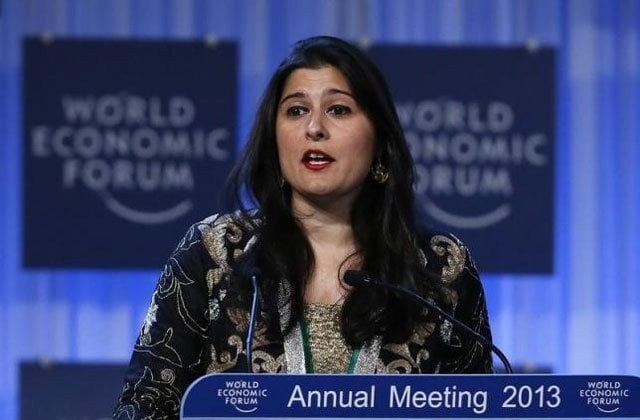Sharmeen Obaid hopes Oscar-nominated film will help end honour killings in Pakistan
Human Rights Commission of Pakistan says more than 500 men and women died in honour killings in 2015

Journalist and filmmaker Sharmeen Obaid Chinoy speaks after receiving the Crystal Award during the annual World Economic Forum (WEF) meeting 2013 in Davos January 22, 2013. PHOTO: REUTERS
The film, which follows the story of a young woman who survived attempted murder by her father and uncle after marrying a man without their approval, was nominated for an Oscar in January, prompting Prime Minister Nawaz Sharif to pledge to take a firm stand against the "evil" practice.
More than 500 men and women died in honour killings in 2015, according to the Human Rights Commission of Pakistan. Many of these crimes, carried out by relatives who say their mostly female victims have brought shame on the family, are never prosecuted, observers say.
PM Nawaz vows to eradicate honour killings after Oscar nod
"People need to realise that it is a very serious crime," Sharmeen Obaid Chinoy told Reuters in an interview in Karachi. "It's not something that is part of our religion or culture. This is something that should be treated as pre-meditated murder and people should go to jail for it."
Obaid Chinoy's film "A Girl in the River: The Price of Forgiveness", scheduled to air on HBO in March, tells the story of 19-year-old Saba from Punjab.
After marrying a man without the agreement of her family, Saba's father and uncle beat her, shot her in the face, put her in a bag and threw her in a river, leaving her for dead. Saba survived, and set out to ensure that her attackers were brought to justice.
Her father and uncle were arrested and went to jail, but Saba was pressured to "forgive" her attackers. That option under the country’s law can effectively waive a complainant's right to seek punishment against the accused, even in the case of attempted murder.
Altering the law to remove the possibility of "forgiveness" could help reduce the number of honour killings in Pakistan, advocates of such a change say.
An act that would amend the law across the country was passed by the Senate Standing Committee on Law and Justice last year, but did not clear the upper house of parliament due to delays, said Pakistan Peoples Party (PPP) Senator Sughra Imam, who introduced the bill when she was a lawmaker.
Both she and Obaid Chinoy hope the attention the film has received abroad and at home, including from PM Nawaz Sharif, might help push the amendments through. "The greatest win of 'A Girl in the River' would be if the prime minister does take the lead, brings the stakeholders on board and they pass the (act)," Obaid Chinoy said.
After the film was nominated in the short documentary category, Nawaz issued a statement congratulating the filmmaker and pledging his government's commitment to rid Pakistan of the "evil" of honour killings by "bringing in appropriate legislation."
Senate likely to clear bills against rape, honour crime
Obaid Chinoy has already won an Oscar in the same category for "Saving Face", a film about acid attacks in the country. The premier invited the director to screen the new film at his residence to an audience of prominent Pakistanis.
Although it is not clear exactly how the prime minister proposes to change existing legislation, Obaid Chinoy said his reaction was a pleasant surprise. "This could be (Sharif's) legacy ... that no woman in this country should be killed in the name of honour, and if she is, people should go to jail for it," she said. "The world is watching."



















COMMENTS
Comments are moderated and generally will be posted if they are on-topic and not abusive.
For more information, please see our Comments FAQ